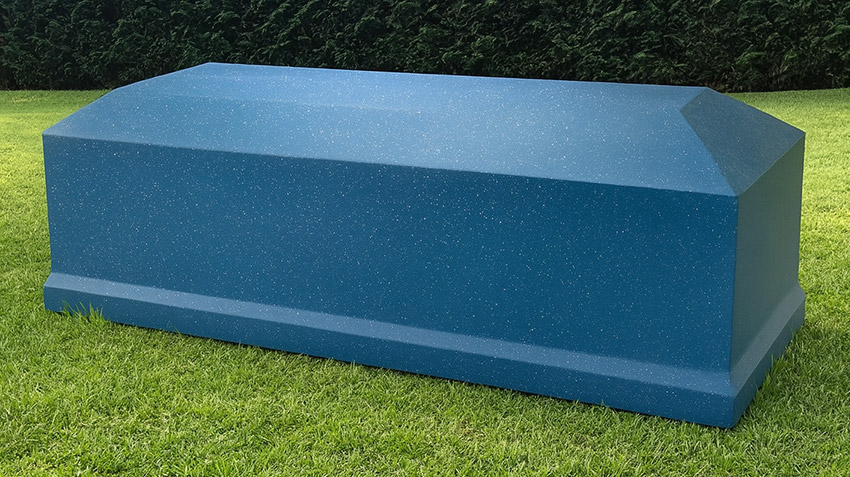
When it comes to modern burial practices, sealed burial vaults are becoming an increasingly common choice for families who want to protect their loved one’s final resting place.
These vaults are designed to offer additional structural support and shielding for the casket, preserving its condition for many years to come.
In recent years, more people are asking about sealed vaults, what they are, how they work, and whether they’re necessary. This guide is for bereaved families currently making funeral arrangements, as well as individuals who are planning their final wishes. Understanding what these vaults offer can bring peace of mind during a time filled with emotional decisions.
1. What is a sealed burial vault, and how does it work?
A sealed burial vault is a type of protective container that surrounds a casket and helps shield it from the weight of the soil above, as well as from water and other elements in the ground. Unlike standard burial vaults or grave liners, sealed vaults are specifically designed to be airtight and watertight.
The sealing process typically involves the use of butyl rubber gaskets or other materials that create an air-tight closure once the lid is placed on the base. This tight seal aims to limit moisture entry and prevent outside elements from compromising the casket. Sealed vaults are most commonly made from materials like reinforced concrete, plastic polymers, or metals such as steel, copper, or bronze. Some models may combine materials, such as concrete lined with plastic or stainless steel, to increase durability and sealing performance.
2. How do sealed burial vaults differ from other burial containers?
There are three main types of burial containers: grave liners, unsealed vaults, and sealed vaults. Grave liners only cover the top and sides of a casket and are primarily used to prevent the ground from sinking. Unsealed vaults offer more protection than liners but lack the airtight and watertight features found in sealed models.
Sealed vaults stand out by offering greater long-term protection. They are constructed to resist moisture, gases, and outside pressure more effectively. This added layer of security can help extend the integrity of the casket, reduce the chance of grave site settling, and provide reassurance to families who want to ensure their loved one’s burial site remains undisturbed. Many people also view sealed vaults as premium burial options due to their construction quality and design features.
3. Why do some cemeteries require sealed vaults?
In many regions, especially in the United States, cemeteries may have specific rules requiring sealed vaults. These regulations are often in place to preserve the overall appearance and safety of the burial grounds. When caskets degrade over time, the surrounding earth can collapse, leading to sunken graves. Sealed vaults help maintain the stability of the ground above and prevent these issues.
In addition, local laws or cemetery bylaws may enforce the use of sealed vaults in certain locations, especially where the soil is damp or flood-prone. Regulations may vary from state to state and even from one cemetery to another, so it’s always important to confirm the requirements before making burial plans.
4. What are the pros and cons of choosing a sealed burial vault?
One of the main advantages of using a sealed burial vault is the added protection it offers the casket. By keeping out moisture and soil, the vault can significantly slow down the natural decomposition process. While this may be a comforting thought for some families, it’s important to approach this with sensitivity and realistic expectations.
Sealed vaults also help prevent ground collapse over time, reducing maintenance for cemeteries and preserving the dignity of the burial site. For many families, the sense of permanence and security these vaults provide can bring peace of mind.
On the other hand, sealed vaults do come with higher costs. The materials and manufacturing involved in creating airtight and watertight protection make them more expensive than simpler options like grave liners. Some people may also have concerns about the environmental impact, as sealed vaults can interfere with natural decomposition. Also, those with specific religious or spiritual beliefs may prefer a more natural return to the earth.
5. Are sealed vaults truly waterproof and airtight?
Sealed vaults are marketed as being both airtight and waterproof, but the reality is more complex. While they are certainly more resistant to water and gas intrusion than unsealed options, no burial container is entirely impervious. Over time, environmental pressure and soil movement can affect the integrity of even the best-sealed vaults.
Manufacturers often include disclaimers that clarify the limits of their products, stating that while sealed vaults are highly protective, they cannot guarantee absolute preservation. It is more accurate to say these vaults significantly reduce the rate of decomposition and help maintain the casket’s condition, but they cannot completely stop natural processes.
6. What materials are used in sealed vaults?
Sealed burial vaults are commonly made from concrete reinforced with steel rods or lined with plastic or metal for extra strength and sealing. Some models are made entirely of plastic polymers or high-grade metals such as stainless steel, bronze, or copper. Others use polystyrene linings inside a concrete shell to combine structure with sealing efficiency.
The choice of material affects everything from weight and cost to sealing ability. Heavier vaults made from concrete and steel are more durable but can be more expensive and require more effort to handle during burial. Lighter plastic or composite vaults may be easier to transport and install, but they may not offer the same level of long-term protection. There are also a few eco-conscious options on the market designed to break down over time in a more environmentally friendly manner.
7. What customization options are available for sealed vaults?
Many sealed vaults can be personalised to reflect the personality and legacy of the deceased. Families can choose from various colors, emblems, inscriptions, or interior linings to create a vault that matches the casket or speaks to the individual’s life. Some vaults are designed with elegant interiors, velvet padding, or symbolic artwork, turning the burial vault into a meaningful tribute.
For those looking to commemorate a loved one in a unique way, these customisation options can offer comfort and a sense of connection during a difficult time.
8. Can you pre-purchase a sealed vault for future use?
Sealed vaults can be purchased in advance as part of pre-need funeral planning. This allows individuals to choose the type and style of vault they prefer, lock in current pricing, and ease the emotional and financial burden on their family later.
Once purchased, the vault is either stored by the supplier or delivered to the cemetery at the time of need. Some providers offer payment plans and secure documentation to ensure all arrangements are in place. Pre-planning also gives people more time to explore different vault options and make decisions based on their values and budget.
9. Are sealed burial vaults available for cremated remains?
Sealed vaults are also available for cremated remains. These are known as urn vaults, and they serve a similar purpose, protecting the urn from ground pressure and moisture. In some cemeteries, the use of an urn vault is required to maintain uniformity and prevent ground settling.
Sealed urn vaults come in various sizes and materials and can also be personalised. Like their full-size counterparts, they provide families with peace of mind that the final resting place of their loved one’s ashes is well-protected.
Frequently Asked Questions
Below are some commonly asked questions to consider:
How long does a sealed burial vault last underground?
While no vault lasts forever, high-quality sealed burial vaults made from concrete and metal liners can maintain their integrity for over 50 to 100 years, depending on soil and environmental conditions.
Are sealed vaults required by law?
In most places, there is no federal law requiring sealed vaults. However, individual cemeteries often set their own rules regarding vault use, so it’s best to check with the specific cemetery in question.
Can sealed vaults be opened later if necessary?
Opening a sealed burial vault is possible but generally avoided. It requires special equipment and can compromise the vault’s sealing. It’s usually only done for legal or investigative reasons.
Choose the Right Sealed Burial Vault
Choosing a sealed vault is a deeply personal decision shaped by practical needs, cemetery rules, personal values, and financial considerations. While these vaults offer durability and long-term protection, they also represent a family’s desire to honor and protect their loved one’s memory with care and dignity. By understanding what sealed burial vaults are, how they work, and what they offer, families can make informed decisions that feel right for them during one of life’s most difficult moments.
Speak to a professional funeral services provider about sealed vaults to help you and your family make your decision.



